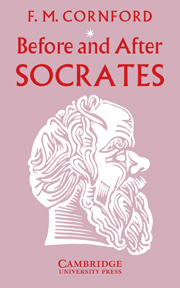III - PLATO
Published online by Cambridge University Press: 05 August 2014
Summary
Socrates was one of that small number of adventurers who, from time to time, have enlarged the horizon of the human spirit. They have divined in our nature unsuspected powers which only they have as yet, in their own persons, brought to fulfilment. By living the truth they discovered they gave the world the only possible assurance that it is not an illusion. By definition, it is a truth beyond the comprehension of their contemporaries and countrymen. Conviction is slowly carried to posterity by the example of their lives, not by any record they bequeath in writing. For, with a few exceptions, they have not written books. They were wise, and knew that the letter is destined to kill much (though not all) of the life that the spirit has given. The only language they could use was inevitably open to misconstruction. A new range of truth can hardly be disclosed in words bearing the worn impress of familiar usage. Those who, by intimate contact, felt the force of their personality, have believed in them, more than in anything they said.
Only by a rare stroke of fortune has one or another of these pioneers of thought found a single disciple who could grasp his meaning well enough to perform the task of handing it on. Even so, there arises a curious dilemma, which can hardly be escaped. Unless this disciple is himself a man of genius, he is not likely to rise to the height of his argument.
- Type
- Chapter
- Information
- Before and after Socrates , pp. 54 - 84Publisher: Cambridge University PressPrint publication year: 1932
- 2
- Cited by



